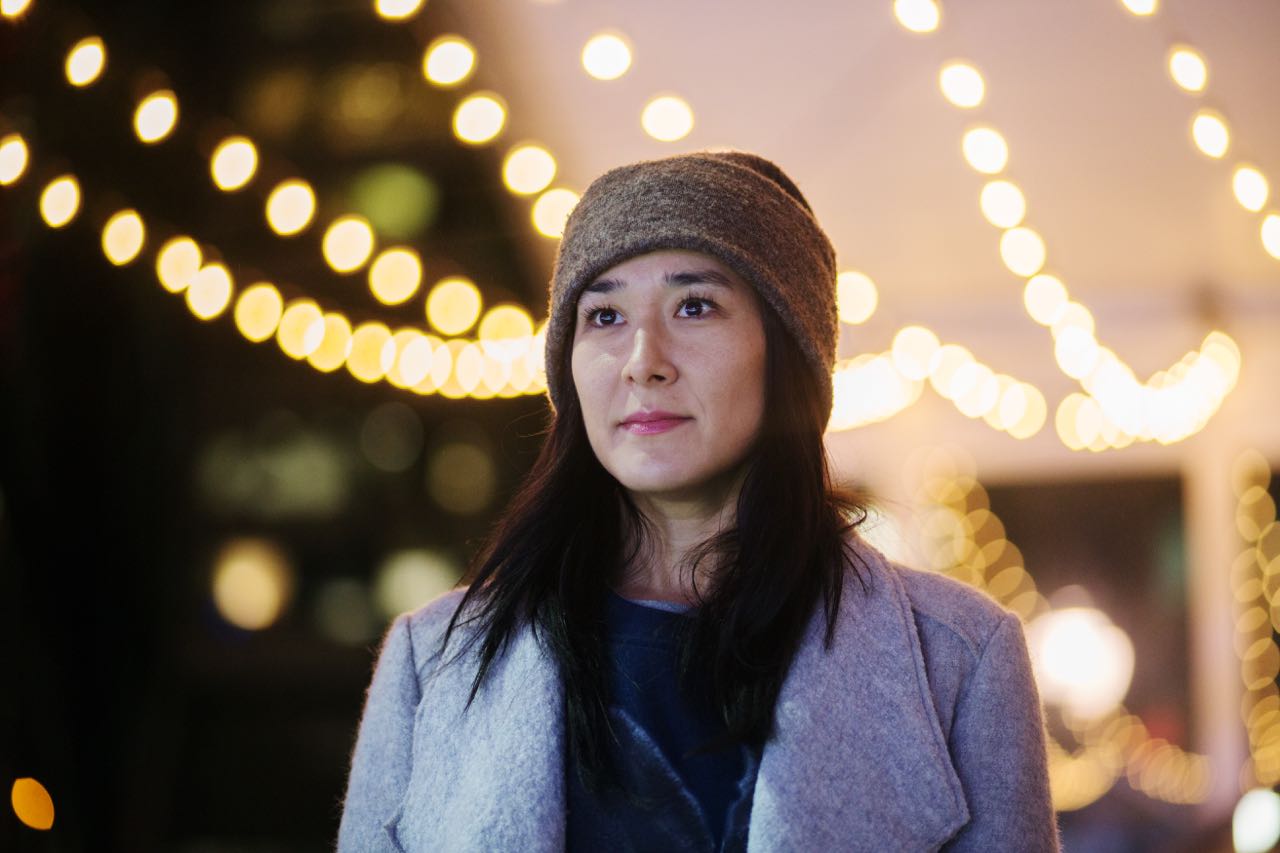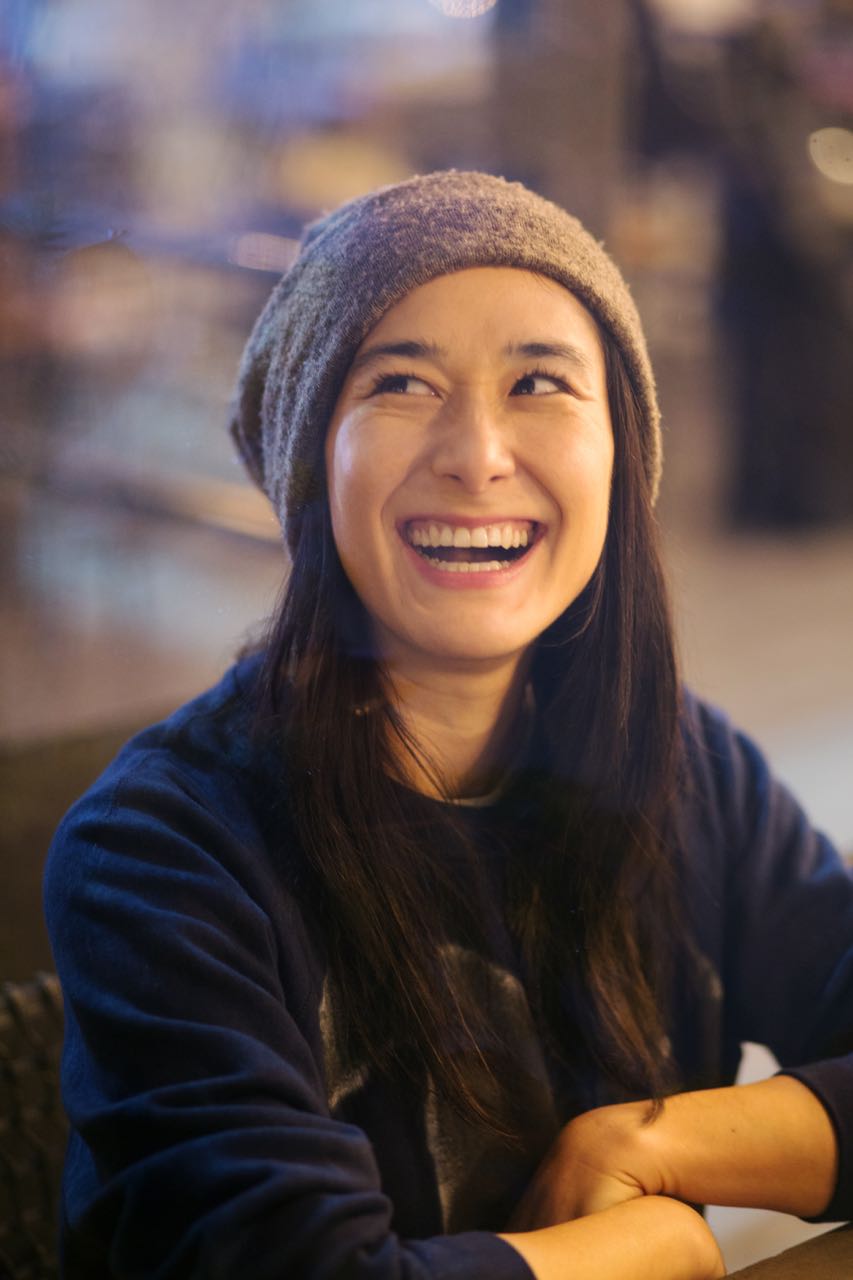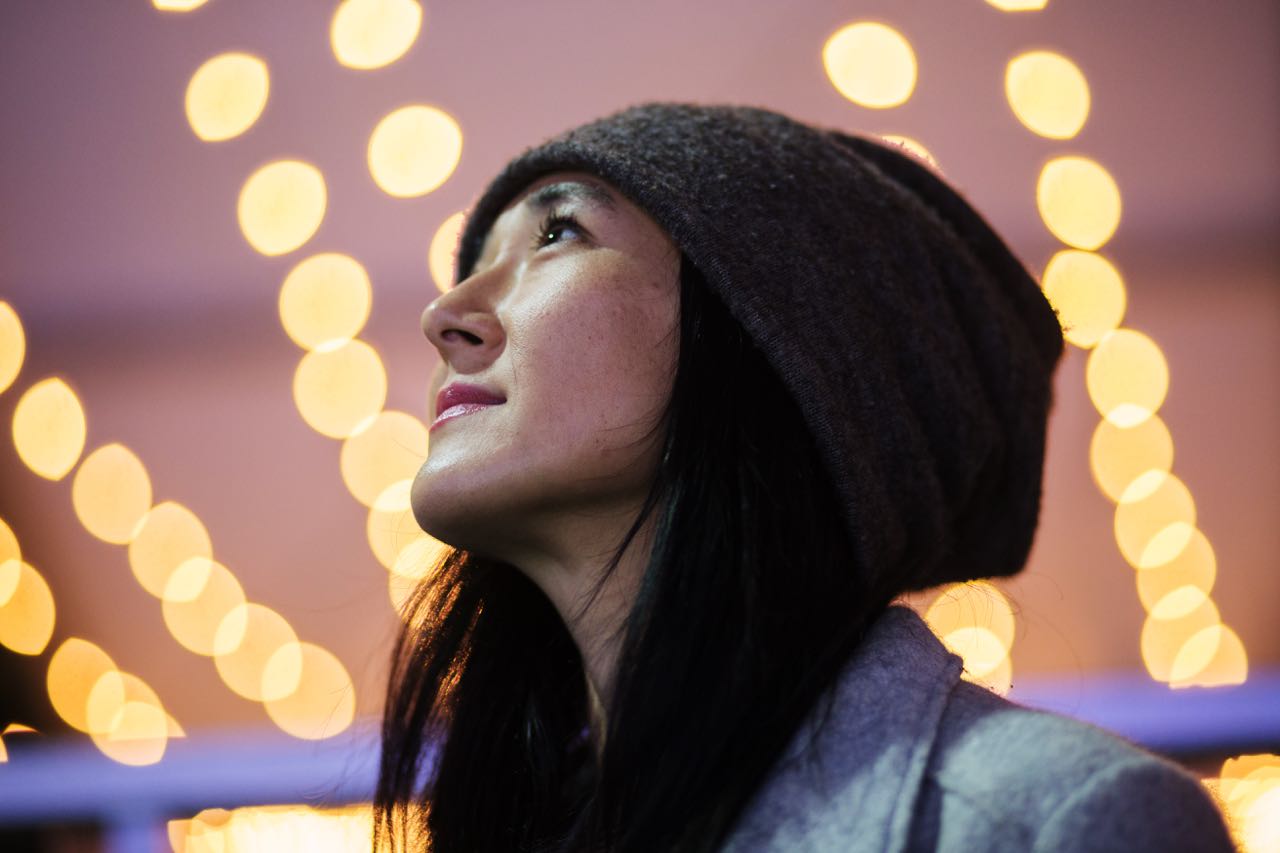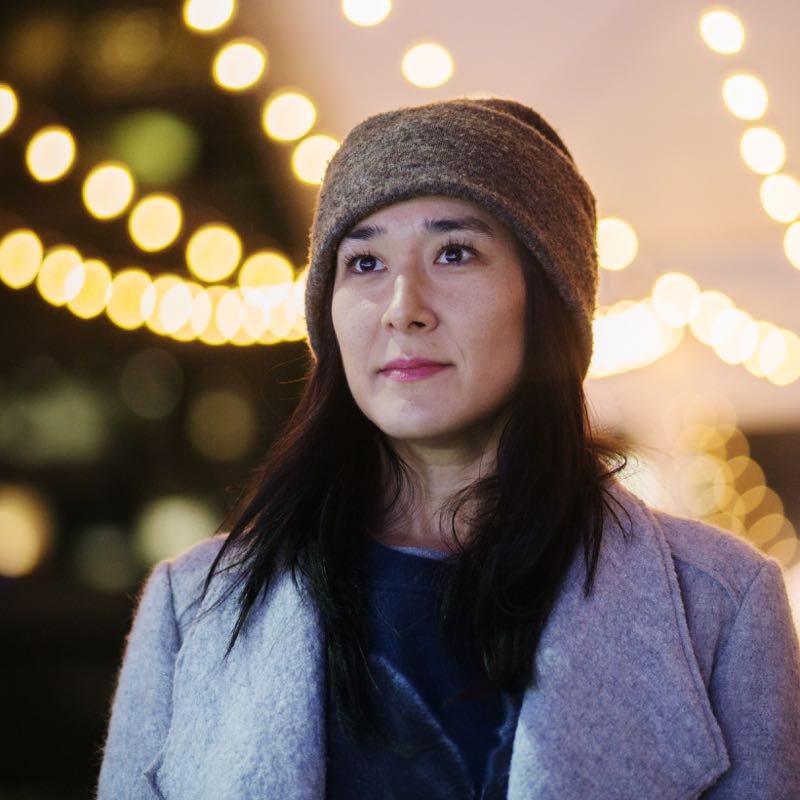An Interview with Jennifer Ikeda

Written by Victoria Myers
Photography by Tess Mayer
February 27th, 2017
Earlier this season, Manhattan Theatre Club presented Qui Nguyen’s Vietgone, directed by May Adrales and featuring a female lead, who, beyond being a multi-dimensional character, embodied a sense of self that remains too rare on the stage. Much of the credit goes to Jennifer Ikeda, who gave a complex and funny performance that left many in the audience saying, “Who is she?” A Juilliard grad, Jennifer has also appeared in Top Girls, Revolt. She Said. Revolt Again., Marie Antoinette, and Titus Andronicus. Now, she’s back at MTC in Linda, a new play by Penelope Skinner and directed by Lynne Meadow. We talked with her during rehearsals about her process, the themes in Linda, parts for women, and more.
You’re in rehearsal for Linda now. When you got the script, what was your way into it? Do you look for ways that the character is similar to you, or different than you?
Usually, it starts with what’s similar. It’s pretty instinctive. There are two processes that happen simultaneously: one is the intellectual homework, which is just combing through the script and pulling out things that people say about your character, what you say about yourself, pinpointing what kind of behavior you have at a given psychological moment, and then sifting through that and being like, “What’s our relationship, how does that color that?” That’s all the head stuff. Then there’s usually just whatever pings emotionally when I first get the script, and that is what anchors me. You build from there, from that line or moment that just resonates for whatever reason, and then try to figure out why. Just build and build.
Do you like to come into rehearsal with a lot prepared, or not as much, and see where it goes once you’re in the room?
It really varies. I think I’ve gotten to the point now where I’m much more rigid about the way that I work because I know what will be helpful and what will be confusing or jumble my mind. In other ways, I’ve become more open to showing up and admitting I don’t know anything and seeing what happens. Sometimes the most interesting stuff happens when I’m like, “I actually have no idea if this is a crazy choice. Can I get away with this? Is this too stupid? Is this too broad?” Usually, if that feeling is there, there’s something interesting happening.
Did it take a while to feel that freedom?
Yeah, it did. When I was younger, I was really sensitive to making sure that the room flowed smoothly, making sure that I was agreeable, making sure that I was nice and that people liked me. That goes a long way. It makes a huge difference to have somebody in a rehearsal room who everybody likes and who bands people together, but I think that when I was younger, I confused that for actually standing up for what I needed and what my process was. It led to a lot of frustration with myself because I couldn’t let it out, because I was too worried about getting into an argument or causing tension or conflict. I’m not as afraid of that anymore. That’s one of the reasons I like being in rehearsals. I like arguing about ideas and what makes something resonate with not just one person, but a community of people, which is what we’re hoping to reach when we’re performing.
I definitely have heard that from other people.
I think, without resorting too much to generalities, there is more of a tendency with women to allow one another to share ideas. I did a lot of plays when I was first starting out that were classical plays, so they were really male-heavy ensembles. It’s a really complicated position being the new, young woman, with maybe two other women in a room full of 15 men. I think now in the wake of the election, it’s something that we’ve all become much more conscious of, and we’re all trying to understand that we all navigate those situations, and to talk about it and talk about what was learned from our experiences and share them, and then fucking get out in the streets and march.
Something else that comes up is that women feel like they have to be grateful to be there.
I think there’s a sense sometimes among actors and among the community that actors should be so grateful for every single job they get. I don’t disagree with that, but I also think that in a lot of situations, those people should be grateful to have me, or to have this actor or that actor. It’s a two-way street.
For Linda, there are a lot of women in the cast and the creative team. What’s that experience been like so far?
It’s really great. It’s been a really methodical and well thought out process. One of the things that’s challenging is that it does take place in London, so there is a bit of a cultural examination that has to happen because there are things that, as an American, get me really fucking riled up and angry and emotional, but Brits just display that emotion in a different way. It’s sort of trying to channel the same energy and anger that everybody’s feeling, but know how it’s framed just a little bit differently there. It’s probably psychological at this point, but when I stand up to articulate an idea or to want to suggest something or try something, it doesn’t feel as momentous when you’re in a room that’s balanced gender-wise.
With this play, do you find any particular challenges with doing something that’s so contemporary, even though that might sound counterintuitive?
That’s exactly right. It looks like naturalism. It looks like a play that takes place in a home and in an office and that sort of thing, but Penny’s writing is really muscular. We’ve been talking a lot, especially in the last couple days, about how sometimes the lines that you’re responding to as a character don’t come until three or four lines later, and having that mental muscularity to be able to understand why that’s happening. We’ve found that it’s actually a much more heightened type of naturalism than it might appear on the page. It’s a more challenging piece than I think one would assume just hearing the word naturalism.

Your character has a big reveal towards the end of the play about what’s been keeping her trapped. How do you build up to that in a way where you’re not necessarily playing the end or playing the reveal, but it’s still there?
That’s something that, early on, where Lynne said, “We don’t want the audience to know that that’s going to be happening.” I think that it ties into figuring out how a young person who doesn’t have a model and who doesn’t have the right support system in place deals with that, because it was a very early instance of revenge porn. How do you move on? How do you navigate in the process? Not that it’s better now, but at least you don’t feel alone. It is something that’s happening in disgusting ways everywhere all the time, but this person experienced something and didn’t have any tools, so how do you cope? How do you figure out your coping mechanisms?
It’s interesting with the whole idea of role models, especially in relation to the play where Linda, your character’s mother, thinks she is one.
That’s part of the fun of the character—she’s somebody who sees hypocrisy. When she sees it, she cannot ignore it. She has to call it like it is, and it’s gratifying to do that. I can channel some of my own desire to call out the bullshit gets to happen a little bit.
What thematically in the show do you find most resonant?
People’s ideas of personal responsibility and what that means specifically to women. It’s such a buzz term: personal responsibility. Women, in many ways, are not allowed to have personal responsibility, because in so many ways we’re denied fundamental equality. How does that look when you thrust these women into these crises? What does that mean? Is there such a thing as choice? What does it mean when society has a construct for you that is not the unlimited construct that you know is available? They’re big questions, and they’re things that we’re all thinking about so much these days. A woman’s body feels like it’s unsafe, you know what I mean? Ta-Nehisi Coates, in his book, talks about the black body being unsafe, and I thought that was such a deeply sad and profound idea, and I think the same applies to women. I think it’s also a complicated play to work on at this time because there are so many personal feelings that it’s like, “How can I go in here and separate my rage about this other situation from these specific characters’ rage about their personal situations? How can I blend that, or make it look like that’s for my character instead?”
Did you have a discussion about that as a company in terms of, “Okay, do we actually try to really bring the current political situation into the play,” or, “The script is done and we’re going to leave the world alone a little bit”?
Penny’s making some revisions on the script, which is great. I think to try and actually make it slightly more complicated, so that the characters are not clear-cut villains or heroines. We talked about how if Hillary had won, this would be a very different experience performing this piece. Actually the urgency, the feeling of needing to make sure that these women’s stories get told, it just feels has been upped now. It was the same with Vietgone. We performed on election night, and then on Wednesday, we had a two-show day. I showed up at the theatre and was crying. The ASM and I were just hugging and wondering how the fuck do we go and do a show right now? We all felt like we’re at a funeral, but there’s nothing I would have rather done than perform that particular play twice that day and to make sure that people still hear that message. I feel really lucky that I’m getting to work on things that are urgent. It’s not just about conflict between mothers and daughters. It’s about conflict between mothers and daughters today with women being under this microscope. So many people have been saying these days, “Art is important. What we’re doing is really important,” and I totally agree. The projects you’re working on don’t always feel as vital as the recent ones have, which is great. It makes you appreciate the grind of doing eight shows a week when you feel like this is urgent.
Something I’m always super interested to ask actresses about is when you’re in an industry that tells you, “This is what you’re good at. This is the type of part you should audition for. This is what you shouldn’t audition for,” how does that affects how you develop as a person and as an artist?
There’s a quote from 30 Rock that’s basically if you’re a woman, you either have to be super skinny or really large. You can’t be in between. You have to be easily definable like, “Help us understand when we look at you, help us have an in right away,” which in my case is also complicated by the fact that I’m mixed race and Asian-American, and that’s always been something that I’ve had to think about and deal with and navigate as well. You just get a different stream of possibilities that get diverted to you as opposed to a lot of the other things that people get to go in for. For a long time, I felt like nobody knew what I could do. I could do all these different things that I was not getting seen for. To be honest, I’ve always just been really thankful to keep getting work, and work that’s stimulating and exciting. I’ve been really lucky in that regard. But there’s that actor shield that you put up that sort of allows you to audition for 20 jobs and not get down when you don’t get any of them, and it’s sort of the same thing that women have to do when we go out into public and we feel like we’re being treated as less than. It’s a similar sort of feeling of just making sure that you know yourself. At the end of the day, we’re all too complicated, each of us as human beings, to ever be categorized, even if you’re the tall beautiful blonde. You’re still much more than that.
I always imagine that the knowing yourself part is hard when you have so many people trying to shove you in a box.
I think another part of that is finally accepting that I also change. I’m not the same person that I was when I graduated from school, and in some ways maybe at that time they were right. Maybe I didn’t have the self-possession to go in for whatever parts they were casting or to be invited to work with whomever. And that’s all right. Being an actor can be the fucking worst, it really can. You either feel like, “Is what I’m doing really important? I’m not saving lives. I’m not even performing a root canal. Am I really helping somebody by doing this?” But you just have to be a shark, keep swimming. Just keep swimming or else you’re going to drown and die.
Right now, coming off of Vietgone where so many people were kind of like, “Oh, who is that girl?” do you feel a pressure to capitalize on that a little bit?
No. I think I wasn’t expecting to be back at MTC so soon. It actually doesn’t feel like any pressure at all because MTC is so great. It really feels like a home. I’m sure in a week and a half, or maybe in an hour, I’ll probably cry a little bit and be like, “Am I miscast? What am I doing? That scene is wrong. Why do I say this line like this?” That always happens. I have to have a moment of existential crisis. But at this point, no. It’s just fun.
You were very funny in Vietgone. What influenced your sense of humor?
There are certain women who I love and think are geniuses at comedy. Julia Louis-Dreyfus, every time I watch her do anything, it’s like you just want to rewind it and analyze it because it’s in her whole body. It’s in her eyes. It’s in her voice. She’s a genius. Of course, Tina Fey and Amy Poehler. Those kinds of people. But also, I think I just finally had a really nice, juicy chance to explore my really goofy, dumb side, which is vast and much larger than would appear.
Since we were talking about role models in a very different sense earlier, do you have any people in the industry who you feel have been role models to you?
I remember when I was a student at Juilliard, when the playwright’s program had one of their readings, Viola Davis came and read one of the roles. I had never heard of her before or seen her in anything before. This is before The Help and before she became known for being the fucking genius she is. I remember I was sitting in the front row in a studio, and I was like, “Who the fuck is this woman, and where has she been? She’s amazing.” She was able to change the temperature of the room just with her performance. She was incredible. From that moment, I was sort of hooked on her. When I made my Broadway debut, I understudied Elizabeth Marvel, and I’ve always been a huge fan of her choices when it comes to the things that she works on and how brave she is on stage, how fierce she is, how smart, how deeply in touch she is with her emotional life. Then I got to work with her a few year after that, which was a fucking dream come true. I still look at things that Elizabeth is doing, and I’m like, “I love that.” If I can have a career like that, you can sign my tombstone that she died happy.
What’s something that you think can be done to improve the development of new work, especially for actors?
I think a lot of it depends on the people who are working on a project. Do they view an actor as an interpretive artist, or do they allow that actor to participate in the process and to inform the development of the play? I’ve worked with both types and everything in between. Some writers are ironclad, they have a movie in their mind, and they know how they want it to be and they know how they want it to sound. If they know themselves, I trust that. If it’s the other way around and they want input, then great. Each process, working on a new play, you have to suss that out towards the beginning and be like, “How much should I speak up?” This ties back into the woman thing, but it also has to do with allowing that writer their creative freedom. I actually don’t know what they intend. I can offer up what I instinctively gravitate towards, but I usually end up speaking up and feeling like I’ve stepped on toes and apologizing. Again, I find that it’s better to do that and not just sit on it. I think it’s just about participation. People have to be willing to participate and willing to step on toes and willing to have their toes be stepped on.

For a few years now, there’s been a lot of conversation, mostly in film and TV, about parts for women. What are your thoughts on parts for women in theatre?
I’ll never forget, when we were doing Top Girls [at MTC], there was a talkback one day. I was on stage for the talkback, and a man in the audience raised his hand. He said, “This play is called Top Girls. I’m a man”—[Said] like, I’m a man, ha ha ha—“What can I learn from a play like Top Girls?” I said, “Well, I’m a woman, what can I learn from a play like Glengarry Glen Ross?” But that’s the essence of the problem, right? Which is that as women, we’re conditioned to be able to watch stories through men’s eyes and to learn how to empathize and find ourselves in that story, because most of the stories that we do get exposed to feature male protagonists. How can we start to train everybody in society to find themselves in a woman’s story as much as in a man’s? That goes for everything. How can you find yourself in a story about LGBT issues or find yourself in a story about Black Lives Matter or about refugees from Honduras? That’s the crux of the problem.
Do you have any sort of dream project?
Well, doing Vietgone was amazing for a couple of reasons. It’s a dream kind of part. It’s really gratifying to know that young, Asian-American women from now on are going to look at that play and say, “I can’t wait to be in that play. I can’t wait to play that part,” which specifically for Asian-Americans, there aren’t a lot of. I love Shakespeare, and there are some plays I’d love to do from that canon. But I also like strange, weird, experimental, not easily understood kinds of work. I like things where I get to put on a funny voice and I get to do some kind of physical something. Something like that would be nice. I also want to do Shakespeare in the Park again, because it’s just so much fun.

